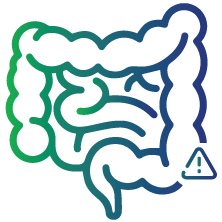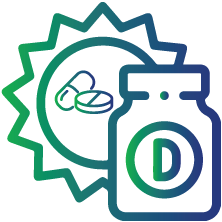
Vitamin D Test
About Vitamin D Test
The vitamin D test, also known as the 25-hydroxyvitamin D test or 25(OH)D test, is the most accurate way to measure the level of vitamin D in your blood. Vitamin D is both a vital nutrient that comes from food and a hormone that your body produces when your skin is exposed to sunlight. It is essential for bone strength, muscle health, immunity, and overall well-being.
A vitamin D test is commonly used by doctors to check if you have vitamin D deficiency, insufficiency, or even excess levels that may cause vitamin D toxicity. People with low levels of vitamin D are more likely to develop weak bones, osteoporosis, fractures, and muscle weakness. On the other hand, excess vitamin D levels can cause hypercalcemia, kidney stones, or organ problems.
At Lupin Diagnostics, patients can easily book vitamin D test online or book 25-hydroxyvitamin D test with the convenience of home sample collection or at a diagnostic center. Transparent and affordable vitamin D test price options are available, making regular monitoring accessible to everyone.
Functions of Vitamin D
The vitamin D test helps identify whether your body has sufficient vitamin D for critical physiological functions. Vitamin D plays a vital role in:
- Bone health: It promotes calcium absorption and bone mineralization, preventing rickets in children and osteoporosis in adults.
- Immune system regulation: Adequate vitamin D levels boost your immune defense against infections.
- Muscle health: It supports muscle strength and prevents cramps or weakness.
- Heart function: Vitamin D helps regulate blood pressure and cardiovascular function.
- Cell growth: It maintains healthy cellular growth and reduces inflammation.
- Cancer prevention: Adequate levels may reduce the risk of certain cancers.
- Hormonal balance: Vitamin D regulates normal blood calcium and phosphorus levels.
By checking your levels with a vitamin D test or 25-hydroxyvitamin D test, doctors can identify deficiencies early and recommend corrective measures. You can book vitamin D test online and verify the vitamin D test price before booking.
What is a Vitamin D Test Used For?
The vitamin D test is an important diagnostic tool used to detect:
- Abnormal bone development in children and adults.
- Low bone density (osteoporosis or osteopenia).
- Rickets in children and osteomalacia in adults caused by vitamin D deficiency.
- Dental abnormalities such as weak teeth and gum problems.
- Muscle cramps and weakness, especially in elderly patients.
- Chronic illnesses like kidney disease, liver disease, or digestive disorders that affect vitamin D absorption.
Doctors recommend regular screening with the 25-hydroxyvitamin D test for patients with long-term health issues. Lupin Diagnostics offers the option to book vitamin D test online, with the vitamin D test price provided upfront for complete transparency.
Who Should Get Tested?
The vitamin D test is recommended for people at higher risk of deficiency or toxicity. You should consider a vitamin D test if you have:
- Age above 65 years (since older adults produce less vitamin D from sunlight).
- Overweight or obesity.
- History of gastric bypass or weight loss surgery.
- Osteoporosis or bone fractures.
- Chronic kidney disease or liver disease.
- Digestive diseases like Crohn’s disease or celiac disease.
- Darker skin tone with less exposure to sunlight.
- Vitamin D supplementation to monitor for possible toxicity.
If you belong to any of these groups, it is important to book vitamin D test online or book 25-hydroxyvitamin D test at Lupin Diagnostics. Affordable vitamin D test price options make it easier to test regularly.
What is a vitamin D test used for?
Vitamin D test is used to determine:

Deformed bones

Low bone density(osteoporosis or osteopenia)

Abnormal bone development

Dental abnormality

Muscle weakness or cramps

Rickets, a problem with bone growth in children

Chronic (long-term) medical conditions
Who should get tested?
Vitamin D test is recommended for individuals at increased risk of deficiencies. The following factors can increase the risk of developing a vitamin D insufficiency or deficiency:

Age over 65 years

Being overweight or obese

History of weight loss surgery

Osteoporosis (low bone density)

Kidney disease

Digestive diseases

Vitamin D toxicity
Test Preparation
No special preparation is required for the vitamin D test. You don’t need to fast before the test. During the procedure:
- A healthcare professional will collect a small blood sample from a vein in your arm.
- The process takes less than five minutes.
- The blood sample is analyzed in a lab to measure the level of 25-hydroxyvitamin D.
When you book vitamin D test online or book 25-hydroxyvitamin D test with Lupin Diagnostics, clear instructions and the vitamin D test price are provided in advance.
Interpretation of results
The test result depends upon the gender, age, and method used. The table below gives the Vitamin D normal range.
|
Reference Range (25(OH)D) |
Interpretation |
|
<20 ng/mL / (<50 nmol/L) |
Deficient |
|
20 – <30 ng/mL / (50 – <75 nmol/L) |
Insufficient |
|
30 –100 ng/mL / (75 – 250 nmol/L)
|
Sufficient |
|
> 100 ng/mL / (> 250 nmol/L) |
Potential Toxicity |
Deviation from normal levels indicates the following:
Deviations from Normal Levels
- Low vitamin D test results:
- Indicate deficiency due to poor diet, lack of sunlight, or malabsorption disorders.
- May also indicate chronic kidney or liver disease.
- High vitamin D test results (Hypervitaminosis D):
- Caused by excess supplement intake.
- Leads to nausea, kidney problems, and organ damage.
Routine monitoring through the 25-hydroxyvitamin D test ensures your vitamin D levels remain within safe limits.
FAQs
What is vitamin D and why does the body need it?
Vitamin D is a fat-soluble vitamin and pro-hormone that helps regulate calcium and phosphorus in the body. It is essential for bone strength, muscle health, and immunity. Doctors recommend the vitamin D test or 25-hydroxyvitamin D test to measure levels. Patients can book vitamin D test online and check the vitamin D test price at Lupin Diagnostics.
What happens when vitamin D levels are low?
Low levels detected in a vitamin D test can cause weak bones, fractures, osteoporosis, osteomalacia, rickets in children, and even increased risk of infections. Regular 25-hydroxyvitamin D test checks help in early diagnosis.
What are the symptoms of low vitamin D?
Symptoms include fatigue, poor sleep, frequent illness, bone pain, muscle cramps, depression, hair loss, and poor immunity. If you experience these, book 25-hydroxyvitamin D test or book vitamin D test online to check your levels
Is excess vitamin D harmful?
Yes. A vitamin D test may show elevated levels due to excess supplementation. High vitamin D leads to hypercalcemia, kidney stones, and organ damage. Doctors recommend regular 25-hydroxyvitamin D tests to ensure safe supplementation. You can also check the vitamin D test price before booking.
What are the best sources of vitamin D?
- Vitamin D2 (Ergocalciferol): Found in sun-exposed mushrooms.
- Vitamin D3 (Cholecalciferol): Produced in the skin with sunlight and present in fish, eggs, and fortified foods.
Monitoring intake with the vitamin D test ensures proper levels. Patients can book vitamin D test online or book 25-hydroxyvitamin D test for accurate results.
What treatments are available for vitamin D deficiency?
Treatment depends on the vitamin D test results:
- Mild deficiency: Sun exposure and diet changes.
- Moderate deficiency: Supplements.
- Severe deficiency: Vitamin D injections.
Your doctor will decide after reviewing your 25-hydroxyvitamin D test results. Patients can book vitamin D test online and verify the vitamin D test price before booking.
How much does a vitamin D test cost?
The vitamin D test price at Lupin Diagnostics is affordable and transparent. You can view the exact cost when you book vitamin D test online or book 25-hydroxyvitamin D test, with home sample collection available

